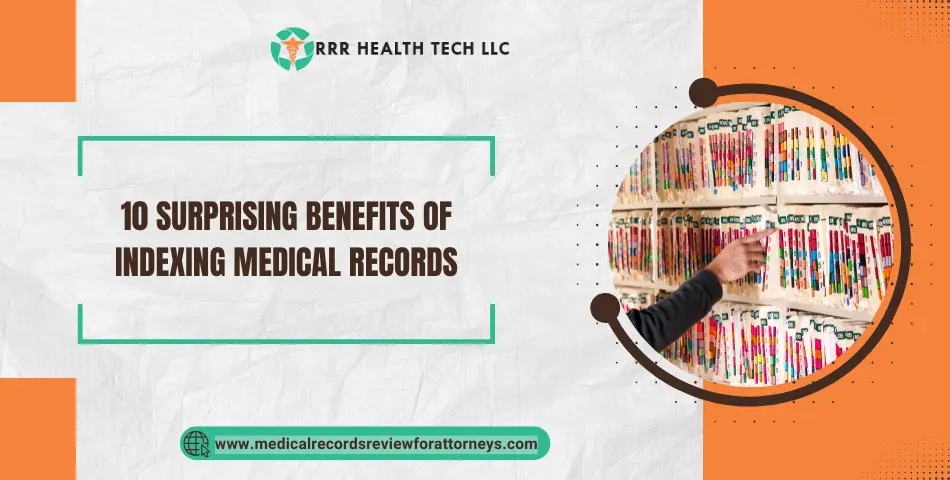
Introduction
The use of indexing medical records concerns the information systems of corporations and institutions. In times of legal or other disputes, such as an insurance claim, medical professionals can call upon a medical index to answer questions about their practice, and specific patients that were seen during a certain period. This alphanumeric code you were assigned allows easy tracking of your files. In a world of rising complexity in medical systems and an increasing need for infrastructure investment in patient involvement, indexing is a necessity.
Through this blog, we will highlight ten unexpected ways in which indexing medical records improves patient care, optimizes the functioning of healthcare systems, and even impacts the legal realm.
1. Enhancing Patient Care and Outcomes with Efficient Medical Records Indexing
By placing medical records in the world of computers, there will be a monumental improvement in access to client information. When patient records are indexed in an orderly fashion, medical professionals can retrieve the client’s identifying details, diagnosis, treatment, and other relevant information within seconds. This can have great positive effects on patient outcomes, as response rates during patient visits drastically improve.
2. Improved Accessibility to Patient Data Through Medical Records Indexing
The availability of organized medical records makes it simple for healthcare providers to look up detailed histories for every patient, which supports critical decision-making. The doctors can follow the record system over time with well-maintained documentation, making more precise decisions, and creating effective treatment schemes. As a result, important information can be easily accessed, leading to enhanced patient services and better patient health.
3. Streamlining Legal Processes in Medical Cases via Medical Records Indexing
Medical records are very important for solicitors working on personal injury claims, malpractice cases, or insurance-owned businesses. Indexed medical records enable the attorneys to work more freely and focus on the important parts because most of the other details are in the index. Such methods can accelerate litigation processes while also minimizing work for people who manage documentation so that all important aspects are basic to prepare for arguments in court and other processes in the case.
4. Boosting Operational Efficiency for Healthcare Facilities Through Medical Records Indexing
Medical records indexing increases operational efficiency by lessening the amount of time used to search for a particular patient’s information. The administrative and care staff within a healthcare center can access patient care records much faster, which increases the speed of service delivery. In addition, a conveniently structured document filing minimizes the chances of misplacement or loss of records so that operations can run freely, as usual, in the healthcare center.
5. Achieving Cost Savings with Effective Medical Records Management and Indexing Systems
Implementing medical records management through indexing can reduce the costs that medical facilities incur. The costs of managing manual records, including papers, space, and people are all manageable and so, economical. Furthermore, records that are digitized and indexed are less likely to be duplicated which improves the integrity of billing and errors, thus reducing costs in the end.
6. Advanced Data Management Strategies Enabled by Medical Records Indexing
The data management pattern is improved with the indexed databases in a way that the healthcare facilities can organize and categorize medical information and retrieve it efficiently. Indexed systems aid in the arrangement of medical records in dossiers according to diagnosis, treatment, and other characteristics of the patient to facilitate the analysis of the patient for making decisions, reporting, and compliance.
7. Supporting Compliance with HIPAA Standards
Through Outsourced Medical Records Indexing Services
When utilizing healthcare services, it is necessary to observe certain rules and regulations, and in this case, escorting medical records indexing ensures that the set HIPAA standards are observed which makes compliance with privacy and security regulations easier.
Moreover, there are specialized services that ensure the creation, compilation, and storage of medical records is done in a compliant manner that guarantees the confidentiality of the patient’s data. When these services are provided, they help ensure that the medical records are indexed appropriately to meet the set standards. This minimizes the chances of violating compliance guidelines that can lead to damaging consequences.
8. Minimizing Errors and Enhancing Accuracy
Professional Medical Records Indexing and Quality Control
There are more benefits than just saving time, as Professional indexing services are also good at error reduction. The medical record indexers have well-established methods and processes that ensure all records are placed in the correct category so that error risks that can affect patient care, legal issues, and insurance claims are minimized. To maintain quality and prevent issues, meticulous measures have been put in place to ensure that errors do not occur. So, the quantity of indexed records that have been altered is increased.
9. Leveraging Specialized Knowledge
Through Outsourced Medical Records Indexing Services
The practice of outsourcing the indexing of medical records helps all healthcare and attorneys. An indexed medical record is the result of an individual who is trained in thesaurus medical terminology, skilled in record classification, and knows indexing techniques. Such records are summarized and more informative. This knowledge fosters comprehensive medical case evaluations, legal practices, and even medical research.
10. Facilitating Research Initiatives and Clinical Studies with Well-Indexed Medical Records
Well-indexed medical records are a necessity for any researcher or medical expert conducting clinical studies and research related to medicine. Indexed medical records serve a key purpose in scouting for information, epidemiological studies, and even for s and d activities. Digested information helps the researchers to follow the disease, the clinical outcomes, and the response to treatment so that the studies are more focused and helpful to the medical field.
Conclusion
There are many benefits of having medical records indexed since it enhances the efficiency and accuracy of their operations, manages patient care, and legal processes, and facilitates research. Implementation of effective indexing ensures that basic patient information is accessible, organized, and accurately categorized, not only by healthcare professionals and their peers but also by legal and research personnel.
The reduction of errors and administrative paperwork coupled with industry-standard compliance ensures cost-effectiveness and improves overall organizational outcomes.
FAQs on Medical records indexing
What is record indexing?
It is the process of organizing medical records in a categorically systematic manner to allow for easy retrieval and management of data. Indexing involves labeling and organizing records based on key data sheets like patient ID, diagnosis, and treatment.
What three indexes are used in healthcare?
The three primary indexes used in healthcare are:
- Alphabetical Index – This index organizes patient data by name or other identifiers.
- Numerical Index – This index arranges records using a unique number associated with each patient or case, together with other data.
- Geographical Index – This index system deals with the organization of treatment records concerning the area or institution where it took place.
What is coding and indexing of medical records?
Indexing and coding medical records entails the creation of diagnostic, treatment, and procedure coding as well as the documentation of the records in a way that allows for easy access and analysis.
What are the methods of indexing in records management?
These methods include alphabetical, numerical, subject-based, and chronology-based indexing. These forms of indexing enable easy and effective organization and retrieval of records.
What are the three types of indexing?
The three main types of indexing are:
- Manual Indexing – The categorization of physical records is done using a manual system.
- Automated Indexing – Categorization and indexing of records are done through software systems and databases.
- Hybrid Indexing – This is the use of both manual and automated techniques for better output.
For those who seek better management of their medical records, patient care, and operational efficiency, professional medical records indexing services are the solution.
RRR Health tech is focused on indexing medical records ensuring that your healthcare operations are optimized while alleviating administrative tasks and enhancing accuracy. Contact us to book your medical chart review and medical record indexing services today!


